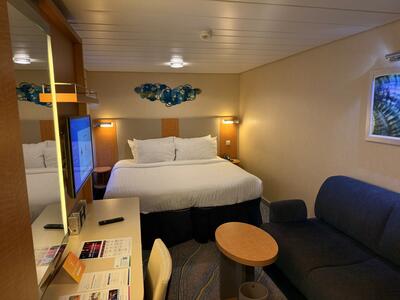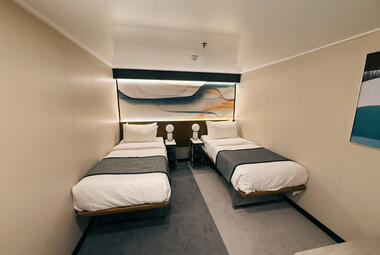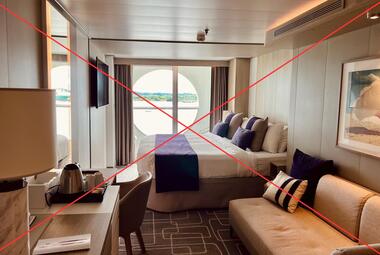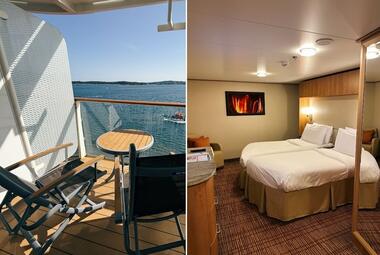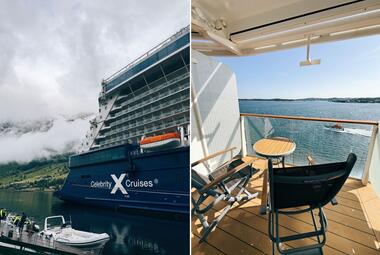When choosing your stateroom, it’s important to consider how close it is to high-traffic or noisy areas of the ship, especially if you’re a light sleeper or traveling with young children.
For example, nobody wants to be kept awake by the thumping of the cruise ship nightclub or woken early in the morning by the sound of deck chairs being dragged across the lido deck.
Before selecting the first available cabin, follow these tips to avoid loud staterooms on your cruise vacation.
Don't play cabin "roulette" to save a few extra dollars
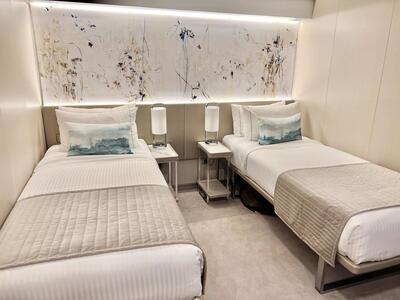
Many cruise lines offer guaranteed rates for passengers who aren't picky about their stateroom's location. While saving money may sound tempting, you could be assigned a cabin in an unfavorable (AKA noisy) location.
Instead of choosing your cabin when booking, the cruise line will randomly assign you a stateroom closer to your departure date, meaning that your cabin is typically selected from a pool of remaining rooms that went unreserved.
Whether it's near a popular venue, underneath the pool deck, or in the front of the ship, there are plenty of reasons why certain cabins aren't selected. If you have a preference about where you want to be—such as near the adults-only sun deck or away from elevator shafts—don't leave your stateroom selection up to fate. You may end up with the nosiest cabin on the ship!
Read more: Are guaranteed staterooms worth the risk?
Stay away from rooms near elevators and stairwells
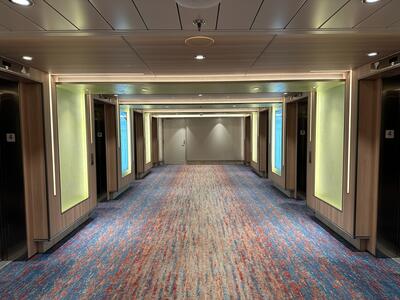
Elevator banks are popular meeting points, even on floors without public venues. As such, cabins near elevators tend to experience more foot traffic, especially during embarkation, disembarkation, and dinner.
Hearing guests—sometimes with young children or stumbling back after too many drinks—coming and going from their staterooms can be disruptive, whether early in the morning or late at night.
Instead, look for cabins in isolated corridors or further from the stairwell. This will ensure you hear minimal noise from guests, as fewer passengers will pass your stateroom. Moreover, you won't risk sharing a wall with an elevator shaft, which would be louder than any passenger could be!
Avoid cabins underneath the pool deck
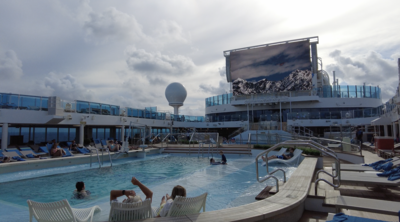
Even if you sleep through crew members rearranging deck chairs early in the morning, staterooms underneath the pool deck are subject to noise throughout the day, ranging from live music to poolside competitions.
Plus, the lido deck is easily one of the most heavily trafficked areas on a sunny sea day, with hundreds of guests heading to the pool to enjoy a cocktail or sunbathe. As such, it's smart to avoid booking a stateroom directly under the pool deck. Rather, choose a cabin a few decks lower, where you'll be separated from the bustling pool area.
Additionally, certain cruise ships, namely Royal Caribbean's Oasis and Icon Class, have interior-facing balconies that could suffer from serious noise bleed, rendering their balconies useless for a serene afternoon retreat.
Read more: Best rooms on a cruise ship
Do not choose a room near high-traffic areas
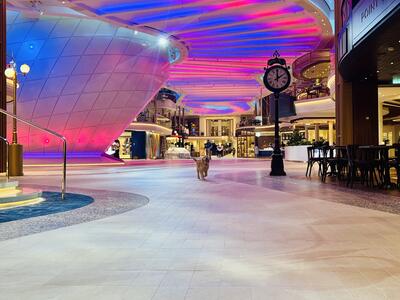
Whether a traditional multi-story atrium or main thoroughfare, all cruise ships tend to have a central hub where you can find everything from Guest Services to activities, onboard shops, and more. Early morning fitness classes, late-night parties, and more keep the energy going in the hub all day, making it a less-than-ideal space to sleep near.
It's easy to locate the central hub on the ship's deck plan. For example, it'll likely be called the atrium on many Carnival ships. If you're looking to sail with Royal Caribbean, the cruise line traded the multi-story Centrum for the Royal Promenade starting with Voyager of the Seas.
This thoroughfare hosts the ship's 24/7 cafe, Guest Services, stores, and more. Still, the deck plans explicitly state where the Promenade is.
Look for staterooms sandwiched between other cabin-only decks

With cabins above and below you, you will experience less noise from high-traffic areas, resulting in a quieter, more peaceful environment for sleeping after long days ashore or taking advantage of the ship's amenities.
Because there are no public venues nearby, the only foot traffic you'll experience are guests coming and going from their cabins, rather than passengers en route to the Main Dining Room, theater, etc.
Read more: 13 tips to sleep better on your next cruise ship
Avoid connecting staterooms
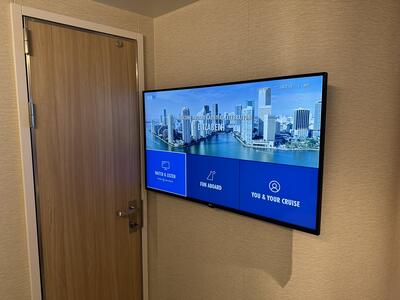
Adjoining cabins are great for large families, providing more privacy while staying close together, rather than across the hall or on a different deck. However, connecting staterooms can also be noisy, especially if you don't know the party in the adjoining room.
Even when the door is closed and locked, you may hear passengers talking or listening to the television—all of which may be louder than expected. On a recent sailing aboard Disney Magic, though I wasn't in a connecting cabin, I still heard children crying in the room next door. I can only imagine how much more pronounced the noise would have been if the staterooms were adjoining!
Connecting cabins can be identified on ship deck plans; however, if you decide not to reserve your specific stateroom when booking, you cannot request for your guaranteed cabin to be non-connecting.
Choose a cabin toward the ship's aft

Staying in the back (or aft) of the vessel means you won't be awoken by the ship dropping anchor early in the morning. Though this only happens at tender ports—such as Grand Cayman, Half Moon Cay, and select Alaskan cities—the noise and subsequent vibrations can disturb a peaceful sleep, especially if you're gearing up for a long day ashore and are sensitive to sound and motion.
However, as mentioned, anchoring is only a concern at tender ports, so if you're sailing to destinations like Nassau, St. Maarten, Cozumel, or San Juan, you don't have to worry about being disrupted early in the morning.
That said, those with concerns about motion sickness should approach forward cabins with caution, as they're subjected to more movement, particularly in rough seas. Midship staterooms are generally a better option for cruisers prone to feeling ill at sea, as they provide a more stable ride.
What happens if you're stuck in a noisy cabin?
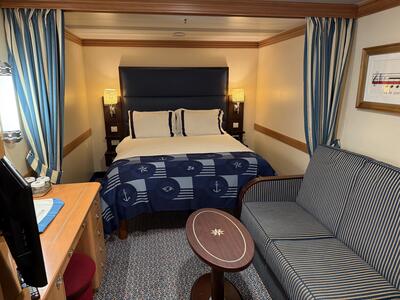
First, try and asses where the noise is coming from. Are the hangers rattling against each other at night? Perhaps the air conditioning is humming louder than anticipated. Note that creaking is somewhat common. While it isn't a cause for concern, it can be annoying.
Either way, determine if the noise's source is inside your cabin or the hallway. Having this information will help crew members address the issue. Begin with your cabin steward. If the problem needs to be escalated to maintenance, they'll send a technician to evaluate the noise and see what they can do to resolve it.
Veteran cruisers also advise coming prepared with sleep aids, such as white noise machines and earplugs, which can make a world of difference in blocking out disruptive sound and helping you sleep better!
Read more: The absolute worst cruise ship cabins to avoid on any ship


